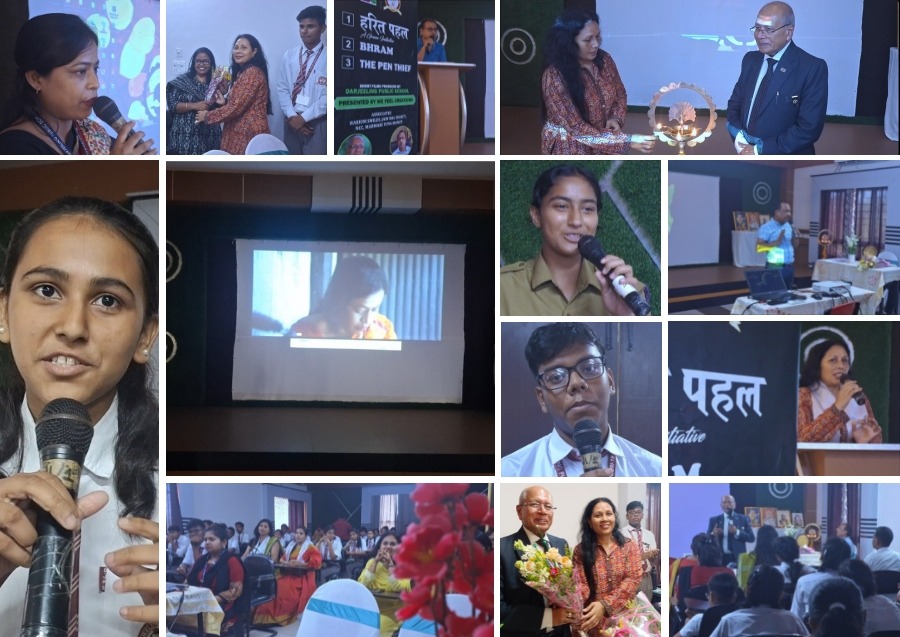 About eight weeks ago, when the Parag and Dipika Biswas’ film, “The Pen Thief” premiered at the central hall of the Darjeeling Public School at Siliguri in West Bengal on World Environment Day along with two other films made by the Biswas duo, it created an instant buzz. The six-minute-long Hindi short film about teachers’ role in reforming their students instantly caught the imagination of the teachers and the students as well as the general public present at the auditorium.
About eight weeks ago, when the Parag and Dipika Biswas’ film, “The Pen Thief” premiered at the central hall of the Darjeeling Public School at Siliguri in West Bengal on World Environment Day along with two other films made by the Biswas duo, it created an instant buzz. The six-minute-long Hindi short film about teachers’ role in reforming their students instantly caught the imagination of the teachers and the students as well as the general public present at the auditorium.
The universal appeal of this little film about kids, which focused on the immensely alarming and depressing erosion of values among youngsters in our country, was very easy to see as the children present at the screening volunteered to speak volumes about how teachers could and must correct the flaws in their learners, without actually using the rod. The goodwill carried on at the international level as it won a whopping 30 awards at various film festivals across the globe.
The Pen Thief is an endearing story of a ten-year-old girl, Subarna, who couldn’t resist the temptation of stealing a highly expensive and immensely attractive pen from the school bag of her classmate during the lunch break. And the Biswas duo tells it with great humanity and candour.
Set in the foothills of the eastern Himalayas in the Darjeeling district of West Bengal, the film offers a contrasting and crucial depiction of the act of theft — through the perspective of the protagonist tottering on the margin of ethical and non-ethical standards — a child from a middle-class family epitomizing the dreams of her parents to rub shoulders with the affluent classes in the society. A costly pen for her is an unattainable privilege. Neither sensational nor patronizing, the film views the harsh realities of how children of less affluent parents feel in an elite school with a conscious and empathetic gaze.
For instance, the girl’s awareness of her circumstances and her lack of courage to ask her parents to buy her a similar pen is such that the thought of having committed a crime doesn’t occur to her until she loses the money her mother had given her for tiffin the following day. In a most affecting scene, the young girl gazes with great satisfaction and wonder at the currency note of Rs 20 her mother had given her. Despite the crime she commits, a moment of vulnerability such as this is a reminder that she is merely a child passing through her formative years, and therefore, amenable to mistakes.
Parag and Dipika Biswas, who have also written the story, script, screenplay and dialogues of the film and have also done its editing, have created an extremely faithful portrait of the modern school life in any city of India: teeming children, premises bustling with students busy in various activities during recess time and teachers controlling classes as hard task-masters ready to use the rod at the drop of a hat.
Cinematographer Manob Ghosh captures the portrait evocatively. The images of the bright pen tossing before the eyes of Subarna in the class, her hands stealthily drawing the pencil box of her classmate out of her school bag during recess and the pen lying motionlessly in a transparent glass on the table of Subarna’s bedroom at night are tremendously immersive.
Almost all those who played the various roles in the film are non-actors, selected from among the students and teachers of the Darjeeling Public School, who are the co-producers of the film along with We Feel Creations. They bring an element of naturalism in their performances led by a winsome Subarna Dasgupta, suitably cast as the protagonist. Her eyes, expressions, body language, and reactions in playing the mischievous minor are as perfectly effortless as the valuable performances chipped in by Satarupa Adhikary, Debolina Talukdar and Alisha Limbu, who essayed the roles of the teacher, Subarna’s mother and Subarna’s classmate respectively.
Most children’s films on moral values nowadays are unnecessarily didactic as they are expected to teach children a lesson. The Pen Thief manages this expectation extremely well without compromising on the craft and storytelling, hence, opening itself to a wider set of audience. It is a unique instance of cinema for children without infantilizing them. In the end, everyone has something to learn — both children and adults — with a few lovely surprises thrown in and some pleasant outcomes.
The film is all set to release on top OTTs on the Teachers’ Day this year and will be available on the We Feel Creations’ YouTube channel from September 6 onwards.
